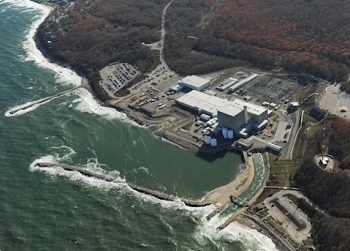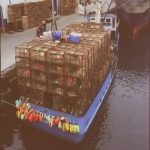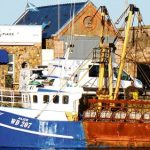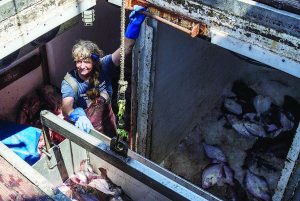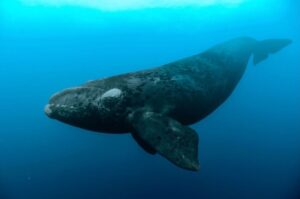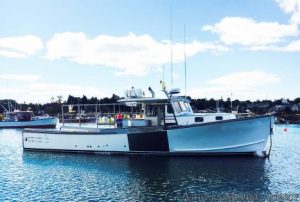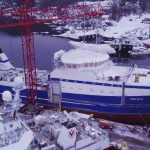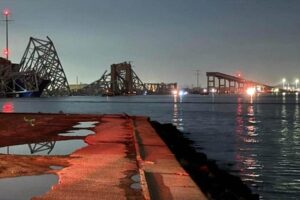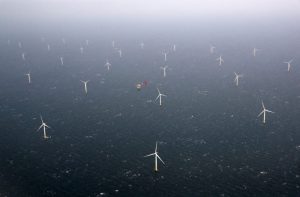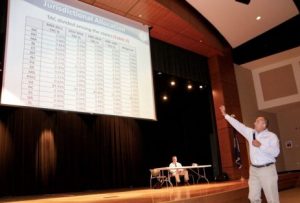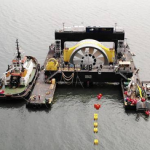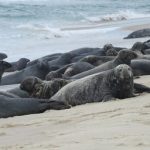Tag Archives: Cape Cod Bay
‘Alarm bells.’ After low oxygen scare in Cape waters, Falmouth company uses $2M to help
 In a small room in the Falmouth Technology Park, Noah Van Home is assembling 450 sensors that will be scattered in waters from Maine to New Jersey to help scientists, fishermen and businesses in the blue economy learn more about the ocean. Lowell Instruments of Falmouth has been hired to manufacture the data loggers that will collect bottom water temperature and dissolved oxygen readings. The program gives fishermen and scientists a look at what’s happening in the water, not just on top of it. Longtime lobsterman David Casoni agrees. He’s been fishing for 50 years, the last four of them with data loggers tied to his lobster traps. He started using them after an episode in September 2019 when lobstermen in Cape Cod Bay started pulling up traps with dead lobsters inside. No one knew what had happened, he said. more, >>CLICK TO READ<< 08:28
In a small room in the Falmouth Technology Park, Noah Van Home is assembling 450 sensors that will be scattered in waters from Maine to New Jersey to help scientists, fishermen and businesses in the blue economy learn more about the ocean. Lowell Instruments of Falmouth has been hired to manufacture the data loggers that will collect bottom water temperature and dissolved oxygen readings. The program gives fishermen and scientists a look at what’s happening in the water, not just on top of it. Longtime lobsterman David Casoni agrees. He’s been fishing for 50 years, the last four of them with data loggers tied to his lobster traps. He started using them after an episode in September 2019 when lobstermen in Cape Cod Bay started pulling up traps with dead lobsters inside. No one knew what had happened, he said. more, >>CLICK TO READ<< 08:28
Long Island Sound Lost Its Lobster Fishery. Is Cape Cod Bay Next?
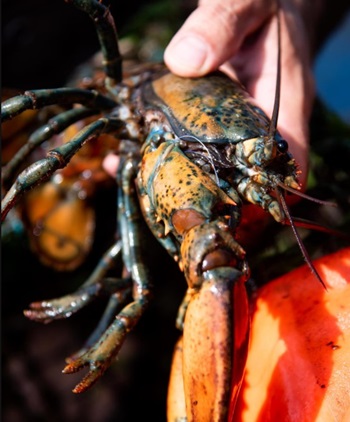 Catches in Cape Cod Bay were good for many years, and prices were good, too. But lobstermen here started worrying in the late 1990s when the fishery collapsed in Long Island Sound. And that worry hasn’t gone away, because environmental changes here resemble those that were affecting Long Island Sound back then. In the aftermath of Tropical Storm Floyd in August 1999, the lobsters in Long Island Sound started coming up dead or lethargic, not making it back to the docks alive. Fall landings for all Connecticut ports dropped between 91 and 99 percent that year, according to a joint report of the state’s dept. of environmental protection and marine fisheries office published in 2000. Fast forward 25 years: hopes for a Long Island Sound population rebound have not panned out. A December 2021 report in the Portland Press Herald introduced Michael Grimshaw this way: “Grimshaw is believed to be the last full-time commercial lobsterman in Connecticut.” His traps used to bring in up to a few thousand pounds a day, wrote reporter David Abel. A good day was now getting him 50 pounds, Grimshaw told him. more, >>CLICK TO READ<< By Capt. Mike Rathgeber 08:40
Catches in Cape Cod Bay were good for many years, and prices were good, too. But lobstermen here started worrying in the late 1990s when the fishery collapsed in Long Island Sound. And that worry hasn’t gone away, because environmental changes here resemble those that were affecting Long Island Sound back then. In the aftermath of Tropical Storm Floyd in August 1999, the lobsters in Long Island Sound started coming up dead or lethargic, not making it back to the docks alive. Fall landings for all Connecticut ports dropped between 91 and 99 percent that year, according to a joint report of the state’s dept. of environmental protection and marine fisheries office published in 2000. Fast forward 25 years: hopes for a Long Island Sound population rebound have not panned out. A December 2021 report in the Portland Press Herald introduced Michael Grimshaw this way: “Grimshaw is believed to be the last full-time commercial lobsterman in Connecticut.” His traps used to bring in up to a few thousand pounds a day, wrote reporter David Abel. A good day was now getting him 50 pounds, Grimshaw told him. more, >>CLICK TO READ<< By Capt. Mike Rathgeber 08:40
Lobstermen Face Hypoxia in Outer Cape Waters
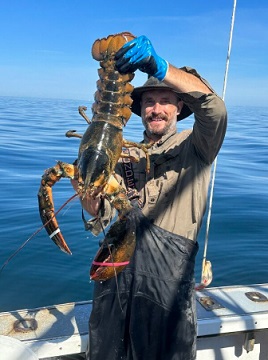 Alex Iacono, a lobsterman who says he favors lobsters and ocean solitude over people, is worried about the future of his business. Iacono, who lives in Truro and fishes out of Provincetown on the F/V Storm Elizabeth, says his catch has significantly dwindled in recent years. He’s not alone; other lobstermen working across Cape Cod Bay have noticed a downward trend. They believe that hypoxia — dangerously low levels of oxygen in the water — is to blame. Hypoxia first came to fishermen’s attention in 2019 when it caused a catastrophic lobster die-off in the bay. After that, the DMF started affixing sensors to buoys and traps to monitor oxygen levels, and they have consistently observed mild hypoxia since then. >click to read< 09:50
Alex Iacono, a lobsterman who says he favors lobsters and ocean solitude over people, is worried about the future of his business. Iacono, who lives in Truro and fishes out of Provincetown on the F/V Storm Elizabeth, says his catch has significantly dwindled in recent years. He’s not alone; other lobstermen working across Cape Cod Bay have noticed a downward trend. They believe that hypoxia — dangerously low levels of oxygen in the water — is to blame. Hypoxia first came to fishermen’s attention in 2019 when it caused a catastrophic lobster die-off in the bay. After that, the DMF started affixing sensors to buoys and traps to monitor oxygen levels, and they have consistently observed mild hypoxia since then. >click to read< 09:50
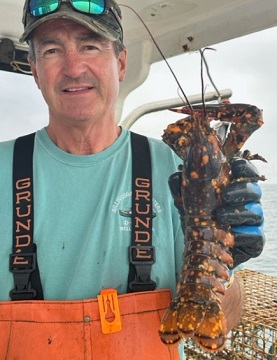
Clarice, the Calico Lobster
In his 15 years of commercial lobster fishing, David Stamatis says he’s never seen a lobster like the one he pulled out of his trap in Cape Cod Bay on July 18. From among the typical brick-red and brown crustaceans crawled a black lobster mottled with bright yellow and orange spots. A calico lobster is a one-in-30-million mutant. It is the third-rarest lobster variant in the world, behind only the split-colored and the albino lobsters. But now he has to figure out what to do with it. He has tried, unsuccessfully so far, to give it away. “I want to donate it so that others can enjoy it and maybe it can be studied,” he said. There’s one particular fate Stamatis hopes doesn’t befall the lobster: “I don’t want anyone to eat it.” >click to read< 11:37

Up to 70 North Atlantic right whales were spotted in Cape Cod Bay
About one-fifth of the world’s entire population of North Atlantic right whales were all spotted hanging out in Cape Cod, Mass., heading into the weekend. Between 60 to 70 right whales, including a mother and calf, were seen feeding outside the east end of the Cape Cod Canal in the Cape Cod Bay on Friday, according to the Massachusetts Environmental Police. The wildlife officials sent out two patrol vessels to protect the whales from boat traffic. By Saturday, the whales had seemingly moved on. >click to read< 11:00
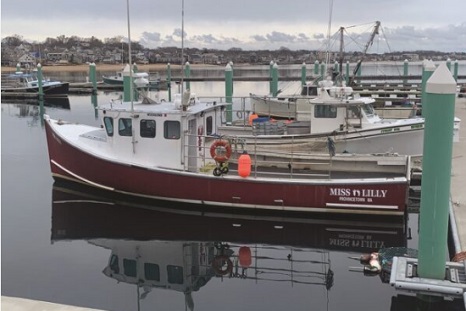
On Demand Gear – Cape Cod Lobstermen Would Rather Wait Than Switch
21-year-old North Atlantic right whale known as Porcia was observed in Cape Cod Bay on March 18. The whale was seen swimming with her 2023 calf by her side. That means Cape Cod lobstermen are on land, waiting out the whales. Elsewhere in Massachusetts waters, however, the NOAA is running an experiment that gives lobster fishermen exempted fishing permits to work in areas that are otherwise restricted. What they are testing is something called on-demand fishing gear. “I think it’s a Star Wars idea that will not work,” said Dana Pazolt, a Truro-based lobsterman who sets his traps on the bay side in the fall and on the ocean side in the spring and summer. Pazolt’s 800 lobster traps have 50 miles of rope. >click to read< 11:10
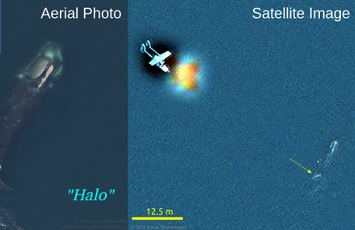
New satellite imagery first to identify North Atlantic right whale from space
New satellite imagery research led by the University of Ottawa is the first to identify a specific endangered Gulf of St. Lawrence North Atlantic right whale from space. Matus Hodul: “The North Atlantic right whale is critically endangered, with about 336 individual whales accounted for. Mortality comes from whales being hit by ships and becoming entangled in fishing gear, so being able to detect and monitor their location is important to conservation efforts. Knowing where the whales are at any given time enables fisheries to open or close to avoid the whales and enables ships to bypass them to prevent collisions.” >click to read< 07:46 ‘Individual North Atlantic right whales identified from space’ >click<
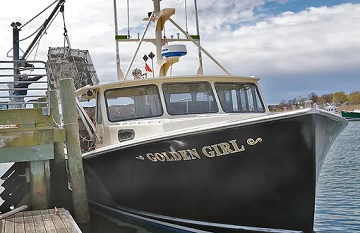
Massachusetts state lobster closure extended
As has become an annual tradition, the state’s yearly fishing closure to protect right whales has been extended until mid-May, cutting short a season already slashed in the name of species protection. The state sent out a notice to lobstermen Friday that the closure for 9,000 square miles of water, tentatively set to end May 1, would be extended through May 15 due to the presence of whales off the coast and near the Cape. For now, Massachusetts lobstermen are restricted to fishing in federal waters, where the season started at midnight Sunday, May 1. >click to read< 11:12
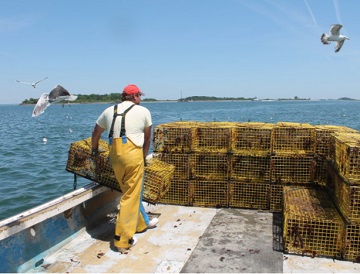
Cape Cod Bay: Lobsters started dying in their traps. Now scientists think they know why
In September of 2019, Tracy Pugh started getting phone calls about dead lobsters. Pugh is a biologist with the Massachusetts Division of Marine Fisheries, and a handful of fishermen in Cape Cod Bay were reporting traps full of dead lobsters, “anywhere from several dozen to hundreds,” she recalled. “So way, way more than normal.” Some reported dead fish and crabs in their traps, as well. One trawler came up with a bunch of dead scallops. Pugh, working with scientists at the Center for Coastal Studies, found the reason soon enough: >click to read< – Karenia mikimotoi, >click to read< 10:08
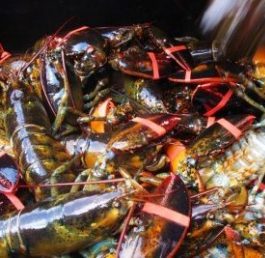
Massachusetts: Lobster season opens on time today after right whales move out of Cape Cod bay
Lobster season for the South Shore will begin as planned after endangered right whales, spotted in Cape Cod Bay, moved out of the area. The Provincetown Center for Coastal Studies previously estimated five whales, including two mother-and-calf pairs, were feeding in Cape Cod Bay, following an aerial survey on April 25. On Wednesday, the Center flew over the area again and found the whales has moved out of the bay and adjacent waters, the Massachusetts Division of Marine Fisheries said in an announcement Thursday afternoon. Although the season starts Friday, it is unlikely anyone will go out because of a forecast of high winds and bad weather. >click to read< 07:11
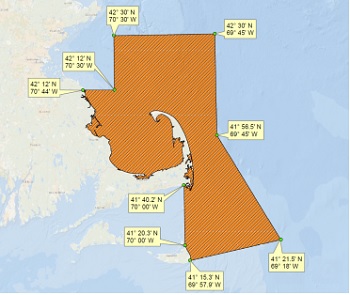
Division of Marine Fisheries Reminder: Large Whale Seasonal Trap Gear Closure in Effect on February 1st
This advisory serves to remind recreational and commercial trap fishermen that the Large Whale Seasonal Trap Gear Closure (Closure) is in effect from February 1 through April 30. The Closure may be extended into May if right whales remain aggregated in the area. The Closure area encompasses the waters of Cape Cod Bay, Stellwagen Bank and eastern Cape Cod (see map). State officials will be patrolling this area in advance of and during the closure to identify gear and notify its owners. >click to read< 08:58
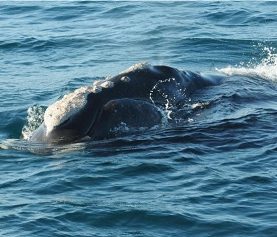
Researchers regroup in wake of 4 right whale deaths
It’s been a deadly month for the endangered mammals, with the carcasses of two other whales — an adult female and a 9-year-old male — reported June 4 and June 20, also in the Gulf of St. Lawrence. Photo analysis of the carcasses found Tuesday identified one as a 33-year-old male named Comet and the other as an unnamed 11-year-old female who had no documented calf, according to New England Aquarium’s Anderson Cabot Center for Ocean Life. The two carcasses were seen near the Acadian Peninsula in New Brunswick and west of the Magdalen Islands in Quebec, according to Canadian officials.,,, The National Oceanic and Atmospheric Administration is taking part in preplanned talks with the Canadian government on North Atlantic right whale protections this week in Halifax, Nova Scotia, NOAA spokeswoman Jennifer Goebel said. >click to read<20:56

Trap Gear Closure and Speed Limit in Cape Cod Bay Lifted Today (Tuesday, May 15, 2018)
May 14, 2018 Aerial Survey shows that right whales have departed Cape Cod Bay The Provincetown Center for Coastal Studies (PCCS) conducted an aerial survey of Cape Cod Bay yesterday (Monday, May 14, 2018) as part of DMF’s ongoing right whale conservation efforts. Clear weather conditions allowed PCCS’ aerial survey team to complete an entire survey of the Bay and no right whales were observed in the Bay. Consequently, DMF has lifted its emergency regulatory closure on the setting of lobster traps and the speed limit of 10 knots or less on small vessels (smaller than 65’) in Cape Cod Bay effective today, Tuesday May 15, 2018. >click to read<11:03
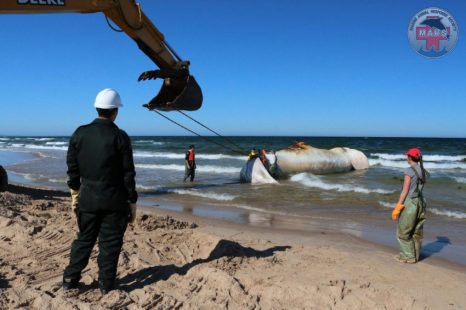
Here’s why 12 right whales died in Canadian waters — and why more will die if nothing is done
A macabre joke in the field is that there are more North Atlantic right whale researchers than actual North Atlantic right whales. The scientific community is tight-knit: on top of the hours many of them spend sardined together on research boats and survey planes, a consortium dedicated to studying and conserving the species gathers every year for a meeting that tips further towards family reunion than your average academic conference. Still, as biologists, conservationists and policy-makers began filling an auditorium at St. Mary’s University very early on a Sunday morning in late October, the emotional register of the meeting felt unusually charged. Attendees greeted each other with bracing hugs. click here to read the story 12:27
How lobstermen gather temperature data from the bottom of the ocean
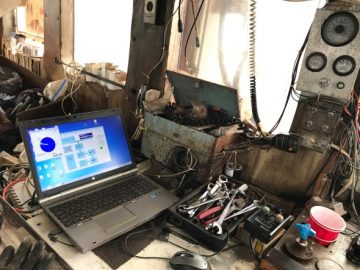 A few decades ago, Jim Manning wanted to know what was at the bottom of the sea. And after years of studying waterways on the Atlantic coast, he says he’s seen a steady change in ocean temperatures that he calls ‘unprecedented.’ Manning is an oceanographer at NOAA’s Northeast Fisheries Science Center (NEFSC) in Woods Hole, Massachusetts. He partners with lobstermen on the Northeast Shelf from Maine to New York, attaching low-cost temperature and depth loggers to some of the millions of lobster traps deployed throughout New England. The project, called eMOLT (Environmental Monitors on Lobster Traps) records and plots . click here to read the story 09:31
A few decades ago, Jim Manning wanted to know what was at the bottom of the sea. And after years of studying waterways on the Atlantic coast, he says he’s seen a steady change in ocean temperatures that he calls ‘unprecedented.’ Manning is an oceanographer at NOAA’s Northeast Fisheries Science Center (NEFSC) in Woods Hole, Massachusetts. He partners with lobstermen on the Northeast Shelf from Maine to New York, attaching low-cost temperature and depth loggers to some of the millions of lobster traps deployed throughout New England. The project, called eMOLT (Environmental Monitors on Lobster Traps) records and plots . click here to read the story 09:31
Trap Gear Closure Lifted; Right Whales Leaving Cape Cod Bay
 The trap closure extension in Cape Cod Bay has been lifted effective Friday May 5 because nearly all the whales that were aggregated in Cape Cod Bay have departed as expected. DMF filed emergency regulations last week to extend the prohibition of trap gear within certain waters of Cape Cod Bay. This closure extension was enacted because in mid-April there was an unprecedented aggregation of over 200 right whales feeding on dense plankton, and more than 100 remained just days before the scheduled May 1 opening. Feeding right whales are susceptible to entanglement in vertical buoy lines. click here to read the notice 22:55
The trap closure extension in Cape Cod Bay has been lifted effective Friday May 5 because nearly all the whales that were aggregated in Cape Cod Bay have departed as expected. DMF filed emergency regulations last week to extend the prohibition of trap gear within certain waters of Cape Cod Bay. This closure extension was enacted because in mid-April there was an unprecedented aggregation of over 200 right whales feeding on dense plankton, and more than 100 remained just days before the scheduled May 1 opening. Feeding right whales are susceptible to entanglement in vertical buoy lines. click here to read the notice 22:55
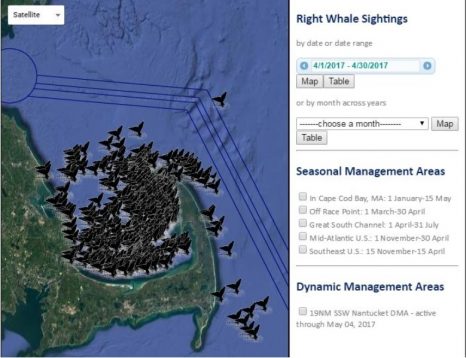
No lobstering until right whales leave Cape Cod Bay
For the past three years there has been a ban on setting lobster traps and pots in the bay from Feb. 1 through the end of April, a ban intended to protect these whales from entanglement. Last week by some counts close to 200 of the estimated total population of 500 Atlantic Western Right Whales were still in Cape Cod Bay. Citing their endangered status and their surprising willingness to stay in the bay because of an abundance of the plankton they feed on, the state’s Division of Marine Fisheries announced that most of the bay would remain closed to setting recreational and commercial lobster traps and pots through next Sunday, May 7. For environmentalists involved in the protection of this species of whale the extended ban was a reasonable, measured action. For many lobstermen it was salt on an open wound. click here to read the story 07:56
Division of Marine Fisheries Extends Trap Fishing Gear Closure in Cape Cod Bay
 As a result of the ongoing presence of endangered right whales feeding in Cape Cod Bay, the Division of Marine Fisheries (DMF) today announced that most of Cape Cod Bay will remain closed to the setting of recreational and commercial traps and pots for an additional week, through May 7, 2017. Right whales are common in Cape Cod Bay during late winter and early spring, especially during the months of March and April, and usually depart before May 1, when the three month (February – April) trap closure affecting this area was scheduled to be lifted. However, over the past month an unprecedented number of whales have been observed, with mid-April counts demonstrating a presence of more than 200 whales. While the most recent survey suggests some whales may have departed the Bay, an estimated 100 to 200 individuals remain present. This late seasonal presence of whales corresponds with extraordinarily high densities of plankton (Calanus copepods), the preferred food of right whales. Read the press release here with imagery 14:43
As a result of the ongoing presence of endangered right whales feeding in Cape Cod Bay, the Division of Marine Fisheries (DMF) today announced that most of Cape Cod Bay will remain closed to the setting of recreational and commercial traps and pots for an additional week, through May 7, 2017. Right whales are common in Cape Cod Bay during late winter and early spring, especially during the months of March and April, and usually depart before May 1, when the three month (February – April) trap closure affecting this area was scheduled to be lifted. However, over the past month an unprecedented number of whales have been observed, with mid-April counts demonstrating a presence of more than 200 whales. While the most recent survey suggests some whales may have departed the Bay, an estimated 100 to 200 individuals remain present. This late seasonal presence of whales corresponds with extraordinarily high densities of plankton (Calanus copepods), the preferred food of right whales. Read the press release here with imagery 14:43






